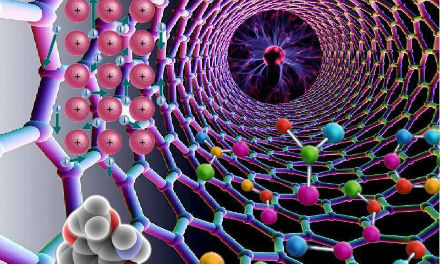|
NOVIDADES
Recent research published in a report in Nano showed biofuels were obtained from Jatropha Oil using carbon nanotube (CNT) catalyst, which showed efficient cracking activity. The performance was activated by the high stability, metal sites, acid sites, electroconductivity, and coking tolerance of CNT. Two cracking circulations were found in the hydroprocessing. The sulphur-free process was also eco-friendly. Hydroprocessing of vegetable oil is widely used to produce biodiesel. The catalyst is very significant for the performance of the process. As an electric charge carrier, the researchers found that the velocity of electron reaches the speed of light 1/ 300 in graphene, far more than the normal conductor. Carbon nanotubes (CNT) are constructed of rolled up graphene sheets with one dimensional extended π conjugated structures. A team of researchers from the Beihang University in China, Beijing has demonstrated that CNT catalysts showed efficient cracking activity. The electroconductivity of the CNT support was especially beneficial for the improvement of catalyst activity. The nickel (Ni) and phosphotungstic acid (HPW) supported on CNT were prepared by the team as catalyst for hydroprocessing of Jatropha oil. Their report appears in the December issue of the journal NANO.  A schematic illustration of hydroprocessing of Jatropha oil into biofuels over a high-performance Ni-HPW/CNT catalyst. It shows a significant performance boost in the catalytic process due to the excellent electroconductivity and coking tolerance of the CNT support. Credit: Long Rong
The transfer of hydrogen electron was accelerated by the electroconductivity of the catalyst, which enhanced the cracking activity of the catalyst, and the results coincided with the formation mechanism of catalyst acidity. The formation of carbenium ion promoted the β-elimination process, which then launched the two circulations for further cracking. The ability of coking tolerance may be related to the morphology of the catalyst and the repulsive force between carbon atoms. Meanwhile, the catalyst was used without sulfurization and the cracking process was green. "This catalyst can be regarded as an attractive candidate for cracking conversion of vegetable oils due to its high performance and clean properties " according to Xiaosong Yang, the senior author of the paper. The Beihang University team is currently exploring catalysts with high performances. More information: Xiaosong Yang et al, A Clean Hydroprocessing of Jatropha Oil into Biofuels over a High Performance Ni-HPW/CNT Catalyst, Nano (2017), DOI: 10.1142/S1793292017501429. World Scientific Publishing. Posted: Jan 16, 2018. Assuntos Conexos: Biocombustível é "janela de oportunidade" para o Brasil, aponta socioeconomista. |
|||||||||||||||||||||||||